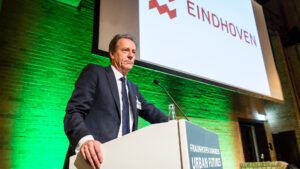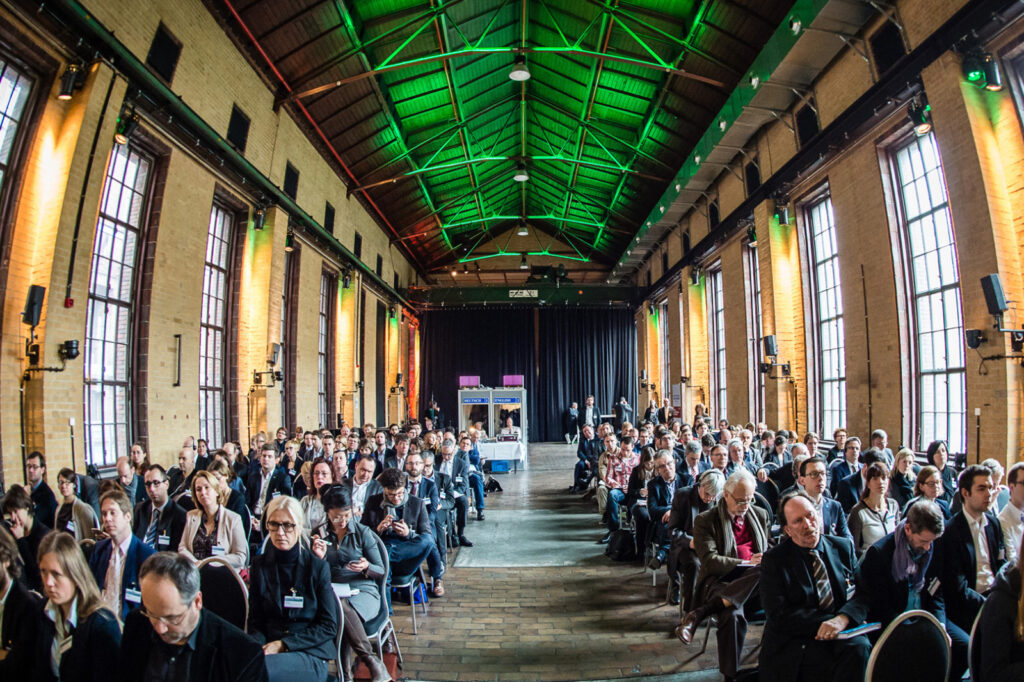BETWEEN BUILDING SKILLS AND LETTING GO
When urban planning, a culture of innovation, and entrepreneurial spirit converge in one place, an interesting dialogue is virtually guaranteed. This was precisely the concept behind the Fraunhofer conference Urban Futures held on November 25 and 26 in Berlin, Germany. On these two days, experts met at a converted factory space in the Kreuzberg district to discuss cities of the future and present realistic concepts for intelligent, sustainable urban planning.
We listened in and found three main propositions that make up the current debate on smart cities.
Proposition 1: Digital cities need competent citize
Ninety percent of Berlin’s residents have little to no knowledge of the concepts behind buzzwords like smart city, big data, or Industry 4.0. That statement was made by Berlin’s Governing Mayor, Michael Müller, in June of this year during an IT summit held at the city’s technical university. “So what?” one might ask. “As long as politicians know what they’re doing.” Dr. Peter Jakubowski explains why that view is shortsighted. He leads the division for Digital Cities, Risk Prevention and Transportation at the German Federal Institute for Research on Building, Urban Affairs and Spatial Development (BBSR). Jakubowski’s tasks include conducting research on the opportunities and risks associated with the digitization of cities. “The smart city concept is destined to fail without skill building among citizens and public officials,” says Jakubowski, and he immediately adds why: in physical terms, our cities will not change dramatically. But they will be equipped with a new operating system, and that requires skill and knowledge. The operating system concept was not Jakubowski’s idea; it can be attributed to Carlo Ratti, who directs the Senseable City Lab at MIT in Cambridge. In his publications, Ratti paints a rather euphoric picture of the connected city, where ambient intelligence breathes new life into aging infrastructure and helps tidy up the chaos of megacities. Based on Ratti’s prognoses, Jakubowski has gathered that speed is essential. Citizens and public officials need to get acquainted with the new technological and economic concepts in order to make sure everyone is planning in the same direction. By itself, the connected city is not enough: it needs to deliver usable options. This requires acceptance, but to accept the trend toward more digitization it must first be truly understood together with all of its opportunities and risks. “Walking around with smartphones does not make us smart citizens,” Jakubowski sums up.
Proposition 2: Digital gaps lead to social gaps
In 2012, a study by the Deutsches Institut für Vertrauen und Sicherheit im Internet (DIVSI – German institute for digital trust and security) revealed that up to 39% of the German population can be labeled “digital outsiders.” The term refers to highly infrequent Internet use or complete abstinence because users feel overwhelmed by options or are afraid of making a mistake. They are joined by “digital immigrants” (20%) – in other words, users who are skeptical about security and data privacy. This number has probably decreased in the past three years. Nevertheless, many people who do not use the benefits of digitization will be left behind. What does that mean for the development of smart cities? For Julian Petrin, an urban planner from the platform stadtmacher.org, the gap that will result is already real: certain processes for public participation are offered online, for example. This creates two problems for digital outsiders. First, they are not aware of these new options, and second, they lack the technical resources to participate. In this case, the solution is relatively simple: Petrin combines the digital options with offline counterparts and also offers participation opportunities in public spaces. If we take this scenario one step further, for example, and think about fully digitized administrative processes, social inequity would quickly become social exclusion. To counteract this growing gap, Werner Spec, mayor of Ludwigsburg, is calling for competition among the municipalities: “No municipality will want to be in the bottom ranks when it comes to knowledge transfer.” Quickly changing processes and growing complexity demand rapid action; the gap between digital outsiders and digital natives will not close on its own.

Proposition 3: Letting go is part of the process
Organizing administrative processes is a complex matter and complexity often requires time. By contrast, citizens have needs and ideas for their cities, and companies are developing new technical solutions. As new possibilities emerge at a faster rate, they may develop a certain independence, even shutting out the state. Suddenly, the state might no longer be setting the pace. But is that necessarily negative? Plenty of positive examples can be found, both big and small. Among others, Petrin cites the Berlin project Holzmarkt, where club owners joined together with citizens to transform a large lot from a nightclub space into one of the most ambitious large-scale projects in Berlin: a green area with space for events, creative ideas, and apartments. Though Petrin jokingly refers to the project as a “hipster favela,” he underscores the new synergy effects that can be found there – the main sponsor is a Swiss pension fund. Yannick Haan, project manager for Hack Your City at the Wissenschaft im Dialog (wid) initiative, also supplied an example: Stuttgart’s problem with particulate matter. Tired of receiving information on current figures for particulate matter from a central measurement station, a group of activists decided to develop their own sensors that will be distributed to host sites throughout the city to provide more accurate readings of pollution on a map. In Eindhoven, Mayor Rob van Gijzel went as far as to consciously give up some control over “his” city – in a positive sense. The intention was to overcome barriers and take risks. Spec, too, sees it as a major opportunity: “If we had the sole remit of city planning, we would simply be too slow.” For Stephan Reiß-Schmidt, city director of Munich, public administrators do not always know what is happening in the sociocultural arena – nor do they have to. But to preserve an open line of communication with urban society in all of its facets, it could make sense to offer certain platforms for interaction. If only to make sure that no one misses the boat.
Note: All talks and panels at the Urban Futures conference are available as an audio stream at www.urban-futures.de/en
